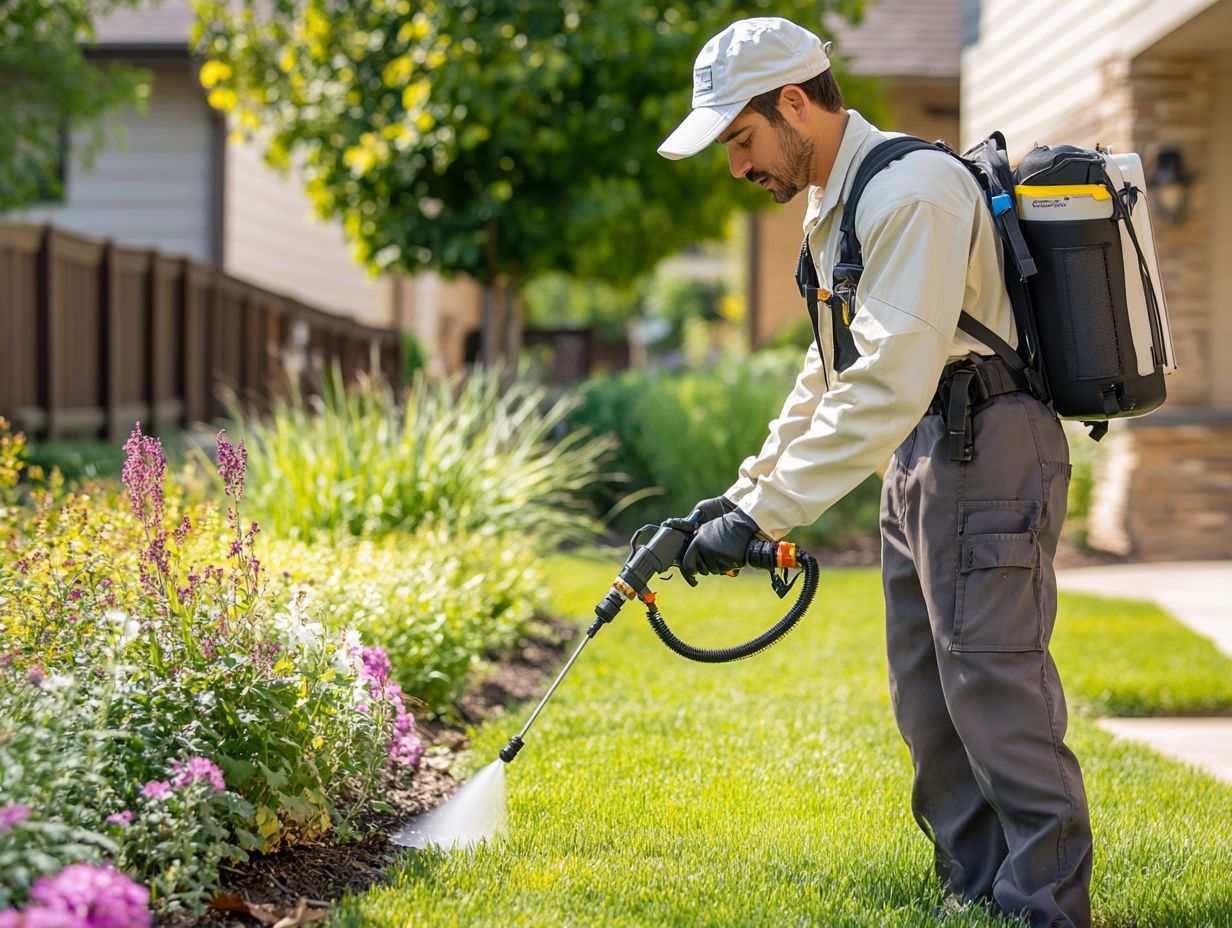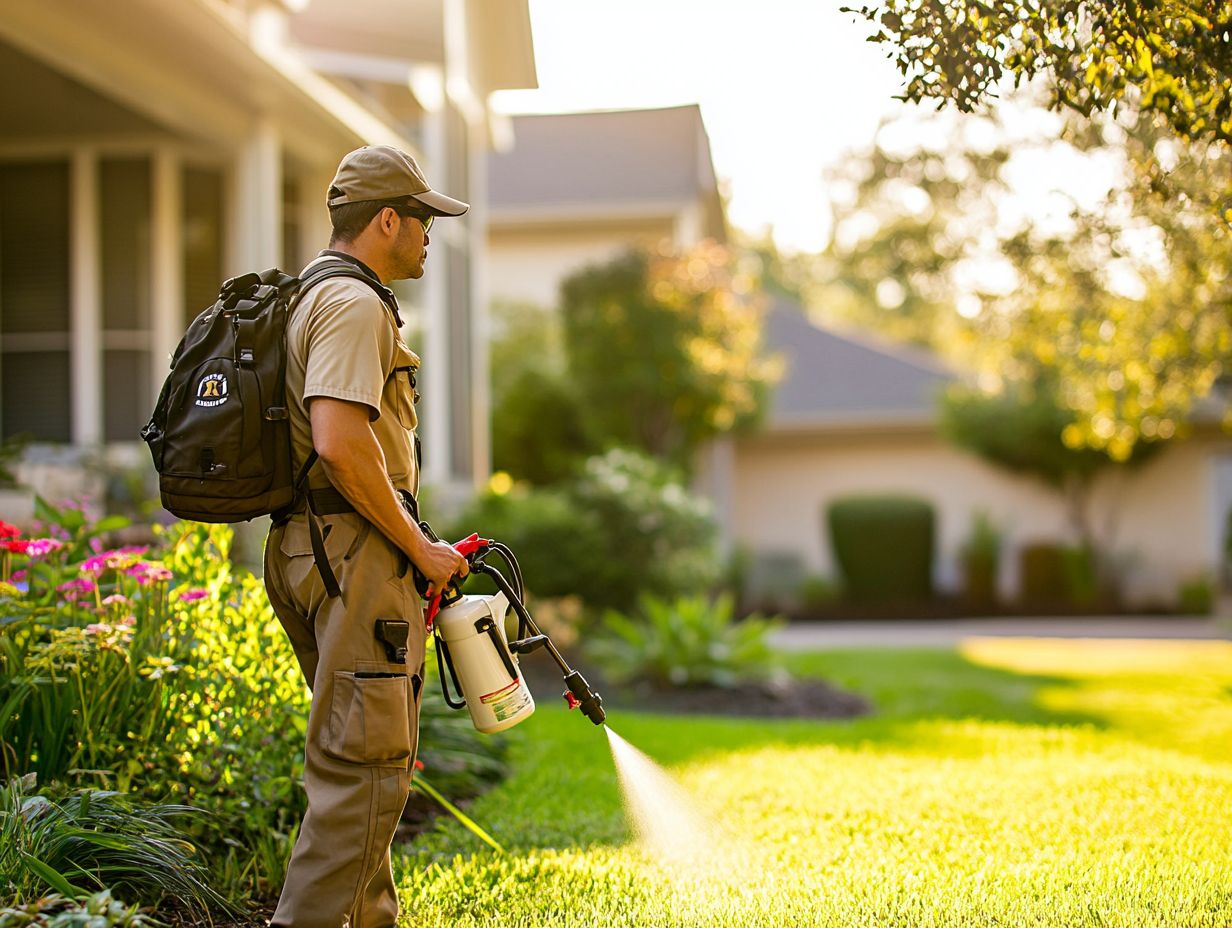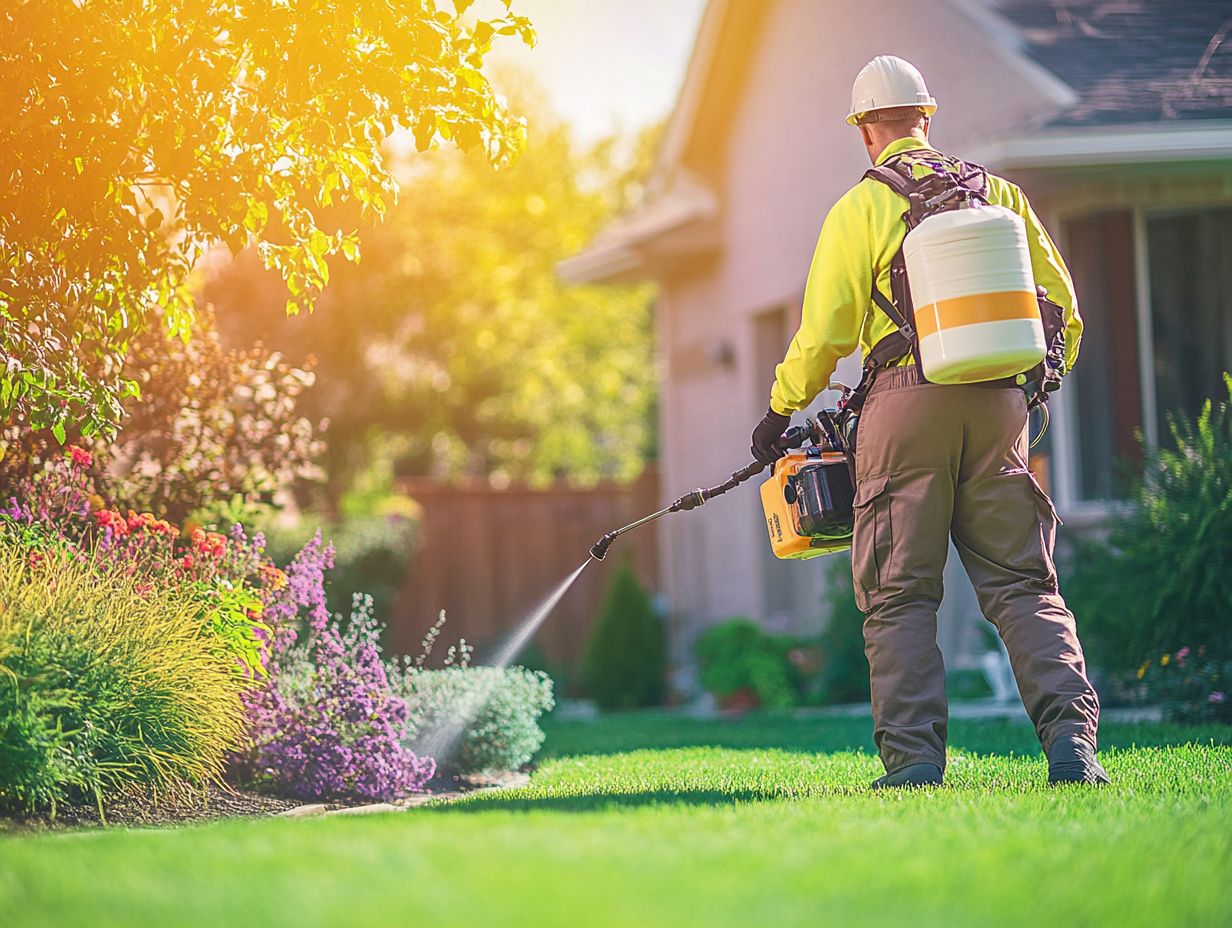Pest control is a crucial part of keeping your business environment healthy and safe. If you neglect this responsibility, you could open the door to some serious risks, ranging from health hazards to reputational damage.
This article dives into the various types of pest control methods you can consider, including chemical, biological, mechanical, and physical options. It also covers effective marketing strategies for pest control companies and highlights the benefits of hiring professionals.
By getting a handle on these elements, you can protect your operations and create a thriving, pest-free environment for your business.
Why is Pest Control Important for Businesses?

Pest control is crucial for your business because it not only safeguards your physical assets but also boosts customer satisfaction and keeps your online reputation shining.
No matter what industry you're in, whether it's retail or hospitality, a pest infestation can lead to some pretty terrible customer reviews and unfavorable comparisons that could hit your bottom line hard.
On top of that, implementing effective pest management strategies helps you avoid health risks related to pests, which positions your business as a trustworthy place that values service quality and customer loyalty.
What are the Risks of Not Having Pest Control?
If you don’t implement effective pest control measures, you’re opening the door to all sorts of risks—think health hazards, property damage, and a reputation that could take a serious hit from negative service reviews and customer testimonials. Infestations can cause structural damage, wipe out your inventory, and even lead to health code violations that might just shut down your operations. That’s why pest management is a crucial part of your business strategy.
But it’s not just about keeping your building standing and your stock safe. Ignoring pest control can have serious health implications for both your employees and your customers. Pests like rodents and insects can carry diseases, which could lead to outbreaks that jeopardize health and ramp up your liability. Plus, if your reputation takes a hit from pest-related problems, new clientele might think twice about doing business with you, which can hurt your profit margins.
By putting robust pest management strategies in place, you not only protect your assets but also build trust with your clients, creating a thriving environment that’s free from infestations.
What are the Different Types of Pest Control?
Understanding the different types of pest control is crucial for you if you're looking for effective pest management solutions for your business. Pest control can be broken down into several methods.
- Chemical pest control, which uses pesticides to wipe out pests;
- Biological pest control, where natural predators come into play;
- Mechanical pest control that involves physical barriers or traps;
- Physical pest control that focuses on making changes in the environment to keep pests away.
Each method has its own uses and impacts on service quality, cost, and effectiveness, so it's worth getting to know them all.
1. Chemical Pest Control
Chemical pest control is all about using pesticides to effectively eliminate pests, making it one of the go-to strategies for professionals in the pest control industry. It’s definitely effective when you need to quickly reduce pest populations, but you also have to think about the safety and environmental impact. This means considering the quality of service and how those pesticides are applied.
While the quick results can be tempting, you can’t ignore the potential hazards that come with chemical exposure, especially for vulnerable groups like kids and pets. There are strict regulations in place that govern how these substances are used, ensuring safety and responsibility.
Plus, with new innovations in pest control technology—like precision application methods and the development of less harmful alternatives—you can tackle pest problems while reducing risks and maximizing effectiveness.
By understanding both the pros and cons of chemical pest control, you can make informed decisions that not only solve your pest issues but also keep health and environmental sustainability in mind.
2. Biological Pest Control
Biological pest control is all about using natural predators to keep pest populations in check. It’s an eco-friendly alternative to those harsh chemical solutions and fits perfectly into an integrated pest management plan. This method works by leveraging the power of natural ecosystems, which means you can cut back on synthetic pesticides and stick to organic pest control practices.
By focusing on insects, birds, and other organisms that naturally ward off unwanted pests, you not only boost sustainability but also promote a balanced ecosystem. The beauty of this approach is that it targets specific pests without taking a toll on beneficial species, helping to maintain biodiversity.
As more growers look to earn organic certification, weaving biological pest control into their practices not only supports environmental health but also helps with crop yield. This combination leads to healthier produce, meeting the rising consumer demand for organically grown foods while strengthening the resilience of agricultural systems.
3. Mechanical Pest Control
Mechanical pest control is all about using physical methods like traps and barriers to keep those pesky critters at bay, making it a pretty straightforward option for managing pests. This approach is especially handy in areas where using chemicals just isn’t the best idea, giving you a non-toxic way to prevent infestations.
Alongside traps and barriers, you can also use tools like insect vacuums and nets to catch unwanted pests without letting harmful substances into your space. These methods work really well in homes, gardens, and farms, where keeping human health and ecological balance in check is a top priority.
For example, if you set up rodent traps in urban areas, you can seriously cut down on the health risks linked to rodent-borne diseases. Plus, installing physical barriers like screens or mulch can stop pests in their tracks before they even think about making themselves at home.
When you combine these mechanical methods with other pest management strategies, you’ll find they’re not only effective but also environmentally friendly, striking a nice balance between safety and effectiveness.
4. Physical Pest Control

You should really focus on physical pest control by making some smart environmental changes to keep those pests at bay. This means sealing up any entry points and removing potential food sources, which can seriously boost the effectiveness of your pest management strategies.
Taking this proactive approach not only protects your property but also lowers the chances of future infestations, highlighting why comprehensive pest control services are so important.
Implementing simple strategies—like keeping your environment clean, using barriers such as screens and mulch, and choosing the right landscaping—can really amp up the results of your efforts. Regular inspections are crucial, too, as they help you spot potential issues before they turn into bigger problems.
By being aware of common pest behaviors and habitats, you can take action quickly to reduce risks.
Focusing on these practical and sustainable tips will go a long way in preventing pests for the long haul, ensuring a healthy and safe living space for everyone involved.
How Do Pest Control Companies Market Their Services?
Pest control companies use a mix of marketing strategies to promote their services, making sure they connect with the right audience and build a solid online reputation. You’ll find them using digital marketing techniques like SEO and local SEO, along with referral marketing programs that tap into customer testimonials.
By leveraging multiple channels, these successful companies boost their brand awareness and drive engagement effectively.
1. Utilizing Digital Marketing Strategies
Digital marketing strategies are key to the success of your pest control business. They boost your visibility and help you attract potential customers through online channels. By using SEO and local SEO techniques, you can optimize your website for organic traffic, making sure you pop up in search results when folks are looking for pest control services.
Effective keyword research is essential because it helps you discover the terms potential customers are using. This allows you to tailor your content to meet their needs. Plus, optimizing your website—like improving page load speed and ensuring it’s mobile-friendly—enhances the user experience and encourages conversions.
Don’t forget to implement analytics tools! They’ll help you track crucial performance metrics, giving you insights into website traffic, customer behavior, and how well your campaigns are working. By analyzing this data, you can refine your strategies, zeroing in on the most profitable channels and adjusting your approach to maximize your returns on investment.
2. Partnering with Local Businesses
Partnering with local businesses can really amp up your marketing efforts in the pest control world. It’s all about creating those win-win relationships that boost community engagement and keep your customers coming back for more. By diving into cross-promotions and referral marketing, you can tap into existing customer bases, expand your reach, and build that all-important brand trust.
When you collaborate with local services, you can leverage each other's strengths to whip up some irresistible offers that draw in new clients while also adding value for your current ones. Think joint marketing campaigns, community events, and networking opportunities; these strategies can help position your pest control business as relatable and accessible in the community.
Getting involved in local sponsorships or community service projects can really boost your visibility and show that you care about the local welfare. This kind of engagement can lead to increased customer interaction, which is always a plus.
Ultimately, these strategies not only strengthen your ties within the community but also help you build a solid reputation for reliability and trustworthiness—two key traits that are essential in the pest control industry.
3. Offering Referral Programs
Referral programs are a fantastic marketing tool for pest control companies, helping you harness customer testimonials and social proof to reel in new clients. By incentivizing your satisfied customers to refer their friends and family, you can effectively grow your customer base while showing your dedication to service quality.
These programs often come with perks like discounts, cash rewards, or even free services for both the referrer and the person being referred, making it a win-win situation for everyone involved. For example, some companies have rolled out a tiered referral system where customers earn bigger rewards for multiple referrals. This not only boosts loyalty but also keeps the participation going strong.
The impact of well-structured referral initiatives on customer acquisition is huge. Referred customers are much more likely to convert into paying clients, which really highlights the trust that comes from personal recommendations. By nurturing these relationships, pest control businesses can significantly boost their credibility and expand their reach within their communities.
4. Using Social Media Influencers
Utilizing social media influencers can really amp up your pest control company’s marketing efforts by reaching a wider audience through authentic endorsements and engaging content. These influencers can help boost your brand awareness and drive those all-important engagement metrics by promoting your pest control services in a way that feels relatable.
When influencers share their experiences with pest control solutions on platforms like Instagram or TikTok, they create a sense of trust and relatability that resonates with potential customers. Campaigns that focus on vivid storytelling and genuine testimonials can greatly enhance your brand reputation, since consumers often prefer recommendations from familiar faces over traditional ads.
By forming strategic partnerships with influencers who share your company’s values, you can foster community engagement and loyalty. This approach can lead to increased customer interaction and boost brand advocacy, making your marketing efforts more effective.
What Are the Benefits of Using Professional Pest Control Services?

When you engage professional pest control services, you’re tapping into a world of benefits for your business. Think enhanced customer satisfaction, effective pest management, and service guarantees that give you peace of mind.
These professional pest control companies come with the expertise, advanced techniques, and tools to tackle even the trickiest pest infestations. Whether it's a routine check or an emergency pest control situation, they've got you covered.
1. Safety and Effectiveness
One of the main perks of hiring professional pest control services is their focus on safety and effectiveness. They make sure that pest management is done in a way that minimizes risks for you and the environment. Trained technicians come equipped with specialized tools and techniques to tackle pests without compromising on service quality.
Their extensive training helps them assess different pest situations and figure out the best, least hazardous methods for treatment. This know-how doesn’t just include understanding pest biology and behavior; it also means using eco-friendly products and integrated pest management strategies.
By conducting thorough inspections and creating tailored treatment plans, these professionals ensure that the process is not only effective but also protects your health and maintains ecological balance. Plus, their adherence to local regulations and guidelines shows their commitment to responsible pest control, which ultimately boosts the safety and effectiveness of their services.
2. Time and Cost Savings
Using professional pest control services can save you a lot of time and money for your business. They take care of everything related to pest management efficiently, so you don't have to lift a finger. Plus, with service contracts available, you can easily budget for pest control, giving you ongoing protection without the hassle of DIY solutions.
By tackling pest problems before they spiral into full-blown infestations, these services help you minimize the risk of property damage and potential revenue loss. Quick action not only keeps your environment clean and safe but also protects your business’s reputation. The pros have the know-how and specialized tools to handle various pest issues quickly, which means you’ll see lower costs in the long run.
Investing in regular pest management gives you peace of mind, allowing you to focus on growing your business instead of fretting over unexpected pest problems.
3. Prevention of Future Infestations
When you hire professional pest control services, you're not just tackling the pests you see; you're also setting up a game plan to prevent future infestations. They use integrated pest management techniques that focus on long-term solutions. Plus, by educating you on how to prevent pests and suggesting some necessary changes in your environment, they offer you real value that lasts.
In this proactive approach, specialists will stress the importance of regular inspections and assessments to catch potential problem areas before they turn into full-blown infestations. They’ll provide you with tailored recommendations, which might include sealing those sneaky entry points, keeping things clean, and using physical barriers to keep pests at bay.
They’ll also keep you in the loop about seasonal pest trends and behaviors, so you can take action before any issues arise. And with the incorporation of innovative technologies like smart traps and monitoring systems, these strategies become even more effective. This way, you not only resolve the current pest problems but also create a pest-resistant environment for the future.
How Can You Tell if a Pest Control Company is Legitimate?
It’s important for you to figure out if a pest control company is legit so you can get effective service and keep those pesky critters at bay. Check for proper licensing and certifications, and don't forget to look for positive customer reviews and testimonials.
You also want to see transparent pricing and service guarantees, as these show the company is serious about maintaining a good online reputation.
1. Proper Licensing and Certifications
When you're looking for a legitimate pest control company, you should definitely check if they have the proper licensing and certifications. These credentials show that they comply with local regulations and industry standards, and they’re key indicators of the service quality and expertise you can expect in pest management.
When you choose a service provider, it’s only natural to want assurance that they’re following the best practices in the pest control industry. Verifying their licenses means that the technicians have gone through the necessary training and education. This not only boosts their skills but also reduces the chances of ineffective treatments or any potential harm to you and the environment.
Certifications from reputable organizations indicate that the company keeps up with the latest pest control techniques and safety protocols. This reflects their commitment to providing efficient and responsible service. So, these credentials aren’t just boxes to check—they’re essential for building trust and ensuring you get satisfactory results.
2. Positive Customer Reviews and Testimonials

Positive customer reviews and testimonials are crucial for figuring out whether a pest control company is the real deal. They give you a peek into the experiences of previous clients and shed light on the quality of service you can expect. A strong online reputation backed by genuine feedback can really sway your decision-making.
When you're on the hunt for reliable service providers, it’s important to dig deeper than just star ratings. Check out reviews on trusted platforms and local business directories that share detailed experiences, response times, and overall satisfaction. Comparing trends in feedback can show you how consistent the service is. You might also want to engage with past clients through forums or social media to get those unfiltered opinions.
By using these strategies, you can effectively gauge the reliability and effectiveness of a pest control company, making sure you choose one that prioritizes quality and customer satisfaction.
3. Transparent Pricing and Contracts
Transparent pricing and contracts are key signs that you’re dealing with a legitimate pest control company. They show that the company cares about your satisfaction and wants to build trust with you. When they clearly communicate costs and services, you know exactly what to expect, which helps you make informed decisions.
When you see straightforward pricing structures, your worries about hidden fees and surprise charges start to fade away. This kind of clarity boosts your confidence in the service provider, paving the way for a long-term relationship between you and the company.
Well-defined contract terms create a mutual understanding and set clear expectations for both you and the provider. This makes you feel valued and respected, which leads to higher satisfaction levels and keeps you coming back for more.
In the end, when a company invests in transparent practices, it really pays off. It enhances their reputation and encourages positive word-of-mouth referrals, helping them solidify their place in the market.
Frequently Asked Questions
What is Proof marketing pest control?
Proof marketing pest control is a form of marketing that specifically targets the pest control industry. It utilizes various strategies and techniques to promote pest control products and services to potential customers.
What are the benefits of using Proof marketing for pest control?
Using Proof marketing for pest control can help increase brand awareness, generate leads, and ultimately grow your business. It allows you to reach a targeted audience and effectively communicate the benefits of your pest control services.
How does Proof marketing differ from traditional marketing?
Proof marketing for pest control differs from traditional marketing in that it focuses solely on promoting pest control products and services. It also utilizes modern digital marketing strategies, such as social media and email marketing, to reach potential customers.
What types of strategies are used in Proof marketing for pest control?
Proof marketing for pest control may include a combination of strategies such as content marketing, search engine optimization, email marketing, social media advertising, and local business listings. These strategies work together to increase brand visibility and drive potential customers to your business.
How can I measure the success of my Proof marketing for pest control?
The success of your Proof marketing for pest control can be measured through various metrics, such as website traffic, leads generated, and conversion rates. It's important to regularly track these metrics to determine the effectiveness of your marketing efforts and make necessary adjustments.
Can Proof marketing for pest control benefit any type of business?
Yes, Proof marketing for pest control can benefit any type of business in the pest control industry, whether it's a small local company or a large national corporation. It's all about finding the right strategies and techniques that work for your specific business and target audience.

